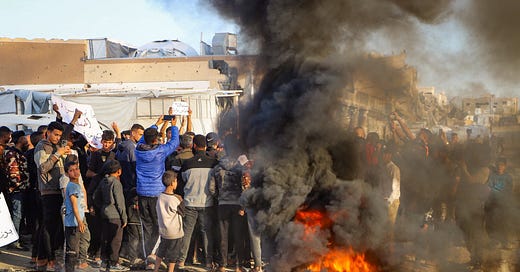Israel, Struggling Hard in Gaza, Remains the World’s Punching Bag
Since the October 7 massacre, the Jewish state can do no right.
Hamas claims growing Gaza protests against its rule actually aimed at Israel. (The Times of Israel)
On Tuesday night two rockets were fired into the Golan Heights from a point about seven miles within Syria. They landed in open areas. It marked the first instance of rocket fire at Israel from Syria since April last year. At the time of writing, it’s not known who launched the projectiles.
Almost simultaneously, a long-range missile fired by the Houthis in Yemen was reaching Israel—the second of the day. Both were downed by air defenses, but not before necessitating air-raid sirens affecting hundreds of thousands of Israelis.
Since March 18, when the IDF renewed its campaign against Hamas in the Gaza Strip, the Houthis in Yemen have dispatched 45 ballistic missiles and at least 10 drones in Israel’s direction. On May 4, one of the ballistic missiles hit Ben-Gurion Airport, injuring six people and prompting major airlines to cancel flights for extended periods.
Israel is subjected to pressures that the countries criticizing it, embargoing arms to it, and threatening to sanction it are not subjected to.
On May 17, Iran’s leader Ayatollah Khamenei stated: “The Zionist regime is the source of corruption, war, and rifts. The Zionist regime that is a lethal, dangerous, cancerous tumor should certainly be eradicated, and it will be.”
Such a call for the destruction of another country is illegal under international law. Yet the statement by Khamenei—whose regime President Trump and his aides have been granting legitimacy by negotiating the nuclear issue with them—didn’t even merit a blip in the news cycle.
Israel has been worried about those negotiations, fearing—among other things—that Iran would use them to stall for time. It now turns out that (a) in recent months—amid the negotiations—Iran’s stock of near-weapons-grade uranium has grown by about half, with Iran now having enough for nine nuclear bombs; and (b) Iran has been “repairing and preparing” its air defense systems that Israel heavily bombed last October.
And all that—projectile fire from multiple locations, open threats of genocide, a growing nuclear stockpile for an archenemy—is without even mentioning Gaza.
To begin with, countries like France, the UK, and Canada, which have threatened Israel with “concrete actions...including targeted sanctions” over its Gaza policy; Spain, which has reneged on a major purchase of Israeli antitank missiles; and many others, including a whole slate of democracies that have embargoed arms to Israel since the October 7 massacre—have not been living for twenty years beside a terror statelet that, in those years, has fired over 20,000 rockets into their territory, culminating in a land invasion involving a grisly rampage of massacre and kidnapping.
Second, for about a week Israel, at great expense and effort, has been trying to solve a key aspect of that problem.
Since the current Gaza war began on October 7, 2023, voices both within and outside of Israel have charged that it’s taking too long, that Israel is not really defeating Hamas, and that it has no plan for a “day after.”
One of the key factors prolonging the war is that Hamas has been systematically stealing food provisions, selling them to Gazans at inflated prices, and thereby both reinforcing itself and keeping the population dependent on it.
Last week Israel, in tandem with a newly formed US organization called the Gaza Humanitarian Foundation, launched an initiative to provide food to Gazans at special locations outside the reach of Hamas.
And if you follow the news at all, you know that since that effort began, the Israel-bashing has a reached a new crescendo.
It works—in a way that could have been predicted with absolute certainty—like this: Gaza’s Hamas-run Health Ministry repeatedly charges Israel with massacres of Gazans. The major international media outlets run with these stories, which can be summed up as: Jews just kill people.
One of the outcomes is that people kill—or try to kill—Jews.
While the news media are raking in the bucks from these irresistible, gratifying stories of alleged Jewish wickedness, and while the UN and governments of democracies ramp up their Israel-bashing even further, the Israeli military conducts slow, painstaking investigations of the alleged events. On that basis, it acknowledges that: amid the confusion wrought by the brand-new aid program, mishaps occurred—but the casualty figures touted by a heinous terror organization are, naturally, exaggerated; and Israel and the Gaza Humanitarian Foundation are working hard to tackle the logistical problems and avoid mishaps in the future.
Meanwhile, the GHF says it has provided over seven million meals to Gazans since the project began last week.
Israel is making a draconian effort to solve a problem of a kind—managing both a war effort and a humanitarian effort in the small, crowded space of Gaza—that its numerous critics have never had to cope with themselves. While the war effort is denounced as pointless, its purpose is to defeat Hamas and ensure that Israel will not have to keep living beside a terror statelet that subjects it to murderous attacks.
Since October 7, 2023, however, in the eyes of much of the world Israel can do no right. The criticisms reflect an absence of empathy and a presence of dark currents of cynicism and worse.





